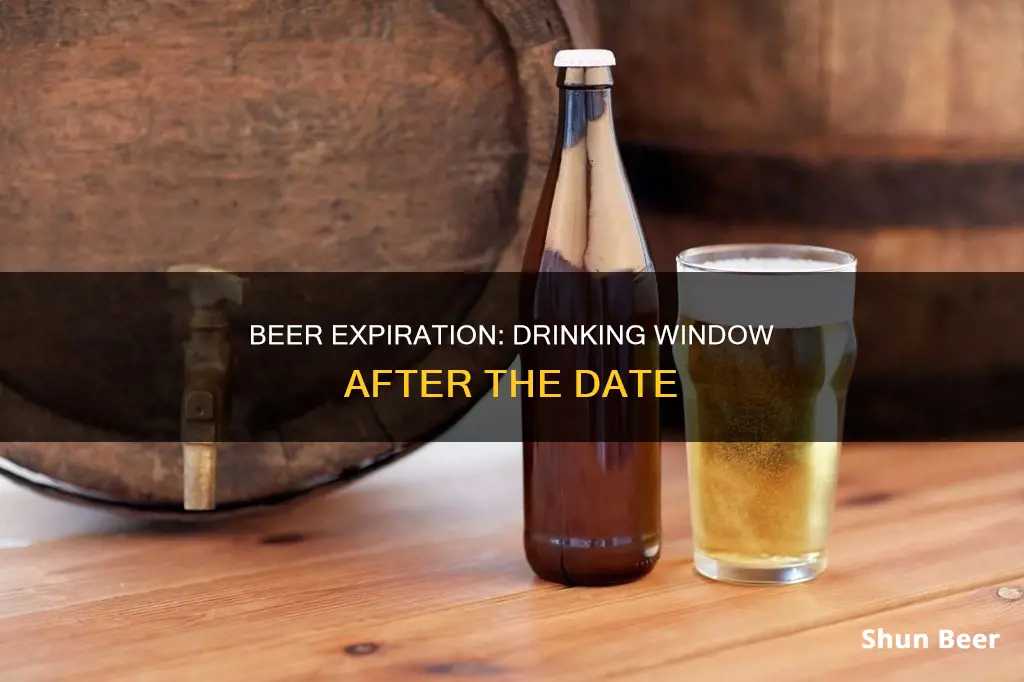
Beer typically lasts beyond its expiration date, but the taste and quality will degrade over time. Beer is unlikely to make you sick, even if it's expired, due to its alcohol content and the presence of hops, which have antimicrobial properties. However, the flavour and aroma of the beer will gradually diminish, and it may develop an unpleasant taste or aroma. Beer stored in a refrigerator will last longer than beer kept at room temperature. Additionally, certain types of beer, such as IPAs, are best consumed fresh, while richer and higher ABV varieties like porters and stouts can improve with age.
| Characteristics | Values |
|---|---|
| Beer expiry | Beer does expire but it won't make you sick. |
| Beer after expiry date | Beer can be consumed for 5-9 months after expiry if stored at room temperature. Refrigerated beer can be consumed for 2-3 years after expiry. |
| Beer taste after expiry date | Beer will lose its flavour and aroma over time. |
| Beer storage | Beer should be stored in a cool, dark place, away from temperature fluctuations. |
| Beer oxidation | Beer should be stored upright to minimize oxidation. |
| Beer and sunlight | Beer should be kept away from direct sunlight to avoid a skunky odour and taste. |
What You'll Learn

Beer can be consumed years after its expiration date
Beer is a beloved beverage for many, but what happens if you discover a long-forgotten can or bottle tucked away at the back of your fridge or pantry? Can you still drink it, or is it destined for the drain?
Rest assured, beer enthusiasts, for the most part, beer can be consumed years after its expiration date. While the optimal window for consumption varies depending on storage conditions and beer type, properly stored beer can last far beyond its "best before" date.
Firstly, it's important to distinguish between the "best before" date on beer and a "use by" date commonly found on perishable food items. "Use by" dates are crucial for food safety, as degradation and bacterial growth can compromise both taste and safety. On the other hand, "best before" dates on beer are more of a guideline on quality. The beer will start to lose its optimal flavour and freshness, but it can still be safely consumed unless there are obvious signs of spoilage.
When it comes to storage, refrigeration is key to maximising the lifespan of your beer. At room temperature, beer typically lasts about 4 to 9 months beyond its expiration date. However, in a refrigerator, unopened beer can last up to an additional 2 to 3 years! This extended shelf life is due to the inhibiting effects of lower temperatures on oxidation and bacterial growth.
It's worth noting that different styles of beer will have varying longevity. Richer, higher ABV beers such as porters and stouts can actually improve with age, similar to fine wine or whiskey. On the other hand, IPAs and hoppy beers gradually lose their prized hoppy aromas and flavours over time, so they are best enjoyed fresh.
While drinking years-old beer may not be the most pleasant sensory experience due to changes in taste and aroma, it is unlikely to make you sick. The fermentation process, along with the low pH and alcohol content of beer, create an unwelcoming environment for harmful microorganisms.
However, there are a few signs to look out for that indicate your beer has gone bad. Firstly, if it has lost its carbonation and fizz, it's a no-go. Additionally, if a non-acidic beer has developed a vinegary taste, it's a sure sign that bacteria have invaded your brew.
In conclusion, while you may not want to serve years-old beer at your next party, it's comforting to know that it won't go to waste. So, the next time you stumble upon a forgotten six-pack, you can pop open a cold one without worry—just don't expect it to taste as refreshing as a freshly brewed batch!
Beer and Amnesteem: Is It Safe to Drink Alcohol?
You may want to see also

It won't taste as good, but it won't make you sick
Beer typically has a "best before" date, which is different from a "use by" date. "Use by" dates are more of a rule, and after the stated date, the product should not be consumed as it may cause illness. On the other hand, "best before" dates are more of a guideline on quality rather than safety. This means that the beer will start to lose its quality in terms of taste and aroma after the stated date, but it can still be consumed.
Beer can be safely consumed well past its "best before" date, especially if it has been stored properly. At room temperature, beer can last about 4 to 9 months beyond its expiration date. In a refrigerator, unopened beer can last up to an additional 2 to 3 years. However, it's important to note that the taste and quality of the beer will degrade over time.
The reason beer doesn't pose the same health risks as expired food is due to its fermentation process, low pH level, and alcohol content, which make it difficult for harmful microorganisms to thrive. Additionally, the presence of hops in beer, which have antimicrobial properties, further inhibits pathogenic growth.
While drinking expired beer won't make you sick, it's important to note that the taste and quality will suffer. The longer the beer is stored, the more its flavour will deteriorate due to oxidation. Beers with higher alcohol content and darker varieties, such as stouts and porters, tend to age better and can even improve with time. On the other hand, lighter beers like lagers and IPAs are best consumed fresh, as they gradually lose their flavour and aroma over time.
To summarise, while it's safe to drink beer past its expiration date, it's not recommended if you're seeking a pleasant drinking experience. The taste and aroma will likely be unpleasant, and the longer it's stored, the more degraded the beer will become.
Beer Gone Bad: Health Risks and Dangers of Drinking Sour Beer
You may want to see also

Beer stored in a refrigerator will last longer
Beer is produced with expiry dates, but these are more like guidelines for quality than safety. Beer is an organic substance, which means it contains chemical compounds from living things, namely yeast. Improper storage can cause these compounds to spoil.
The type of beer also affects its shelf life. Stronger beers, such as stouts, porters, and high-alcohol content beers, tend to last longer than lighter beers like lagers and pilsners. Hoppy beers, like IPAs, are best consumed fresh to enjoy their full flavour and aroma.
To maximise the shelf life of beer, it should be stored in a cool, dark place, away from temperature fluctuations, and upright to minimise oxidation. Exposure to sunlight and oxygen can create a chemical reaction in the beer, breaking down its flavour components until the beverage smells and tastes like skunk spray.
Beer Fast: Does It Work Quickly?
You may want to see also

Beer in clear or green glass bottles will spoil faster
The use of clear and green glass bottles for beer is often a marketing decision rather than a practical one. Clear bottles showcase the colour and texture of the beer, while green bottles were once a status symbol for premium beer. After World War II, there was a shortage of brown glass, so European brewers exported their beer in green bottles. As these beers were extremely high-quality, the green bottle became associated with great beer.
To prevent beer in clear or green glass bottles from spoiling faster, it is important to store it in a cool, dark place, such as a basement or cellar, and to drink it as fresh as possible. Additionally, keeping the beer refrigerated or stored in a cool cellar can help slow down the oxidation process and preserve the beer's flavour.
Beer and Diflucan: Is It Safe to Mix?
You may want to see also

Stronger beers tend to last longer than lighter beers
Beer does expire, but it doesn't pose any health risk. Drinking expired beer will likely result in an unpleasant taste and aroma, but it won't make you sick. Beer typically lasts about 5 to 9 months beyond the expiration date listed on the label if stored at room temperature. Refrigeration can extend this period to 2 to 3 years. However, the type of beer also affects its shelf life, and stronger beers tend to last longer than lighter beers.
Stronger beers, such as stouts, porters, and high-alcohol content beers, have longer shelf lives compared to lighter beers. Lighter beers like lagers and pilsners have shorter expiration dates. One reason for this difference is the presence of hops, which have antimicrobial properties that inhibit pathogenic growth. However, hops are also delicate and susceptible to oxidation, which can lead to a loss of flavour and aroma over time.
Lighter beers often have lower ABV (alcohol by volume), which means they have a lower alcohol content. Alcohol acts as a preservative, so beers with higher alcohol content tend to last longer. Additionally, the delicate flavours and aromas of hops, which are more prominent in lighter beers, can deteriorate over time.
The brewing process also plays a role in the shelf life of beer. Some speciality beers, such as lambics and saisons, are produced with yeasts that continue to live in the beer for years, consuming sugar and oxygen and altering the flavour over time. This can lead to more complex flavours that develop and improve with age.
Lastly, the packaging and storage conditions also impact the longevity of beer. Lighter beers are often packaged in clear or green bottles, which offer little to no protection against UV light. UV rays can cause a chemical reaction with certain hop compounds, resulting in an unpleasant skunky odour and taste. Stronger beers, on the other hand, are sometimes brewed with ageing in mind and may be packaged in darker bottles or stored in cool, dark conditions, prolonging their shelf life.
Drinking Beer Underwater: Is It Possible?
You may want to see also
Frequently asked questions
Beer can be drunk years after its expiration date and it won't be unsafe, although the taste will deteriorate over time. If kept in the fridge, beer can last up to two or three years past its expiration date. If it's not refrigerated, it will last up to nine months.
Beer that has gone bad will have an obvious bad aroma. It might also be flat and lack the usual fizz when you open it. If it's in a bottle, check the bottom for excessive sediment, which could contribute to a poor taste.
Beers with higher ABV tend to last longer than lighter beers. Stronger beers, such as stouts and porters, can improve with age, especially if they're kept in cool, dark storage. IPAs, on the other hand, don't age well and are best drunk fresh.







